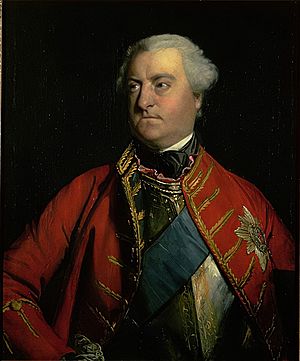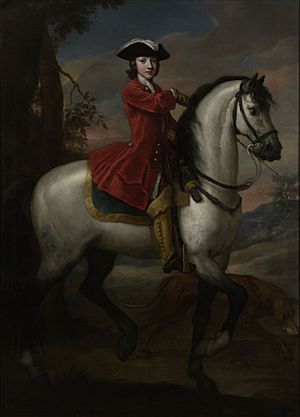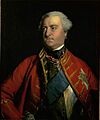Charles Spencer, 3rd Duke of Marlborough facts for kids
Quick facts for kids
The Duke of Marlborough
|
|
|---|---|

Portrait by Joshua Reynolds c. 1759
|
|
| Lord Privy Seal | |
| In office 8 June 1755 – 22 December 1755 |
|
| Monarch | George II |
| Prime Minister | The Duke of Newcastle |
| Preceded by | The Earl Gower |
| Succeeded by | The Earl Gower |
| Lord Steward of the Household | |
| In office 1749–1755 |
|
| Monarch | George II |
| Prime Minister | Henry Pelham The Duke of Newcastle |
| Preceded by | The Duke of Devonshire |
| Succeeded by | The Duke of Rutland |
| Personal details | |
| Born | 22 November 1706 |
| Died | October 20, 1758 (aged 51) |
| Spouse | Elizabeth Trevor |
| Children | |
| Parents | |
| Military service | |
| Allegiance | |
| Branch/service | |
| Battles/wars | Seven Years' War |
Charles Spencer, 3rd Duke of Marlborough (born November 22, 1706, died October 20, 1758) was an important British soldier, nobleman, and politician. He came from the famous Spencer family. He held important government roles, including a short time as Lord Privy Seal in 1755. He is also known for leading British forces during the Raid on St Malo in 1758.
Contents
Early Life and Family

Charles Spencer was the second son of Charles Spencer, 3rd Earl of Sunderland. His mother was Lady Anne Churchill. She was the daughter of John Churchill, 1st Duke of Marlborough, a very famous military leader.
Charles inherited the title of Earl of Sunderland from his older brother in 1729. Later, in 1733, he inherited the title of Duke of Marlborough from his aunt, Henrietta Godolphin, 2nd Duchess of Marlborough. When he became Duke, he gave the Sunderland family lands to his younger brother, John. However, he didn't get to live at Blenheim Palace until his grandmother, Sarah, the dowager duchess, passed away in 1744.
A Duke on the Cricket Field
On July 14, 1737, Charles Spencer showed his love for sports. He was the captain of his own cricket team. They played a match against the team of Frederick, Prince of Wales at Kew Green. The Prince's team won the game. This is the only time we know of Charles Spencer playing cricket.
Helping Children in Need
Charles Spencer was also a kind and caring person. He was one of the first governors of London's Foundling Hospital. This hospital was started in 1739. It was a very important step in helping children in Britain. It showed a new way of thinking about child care.
Service in the Seven Years' War
Charles Spencer is most remembered for his military service. He played a key role in the early years of the Seven Years' War.
The Raid on St Malo
In 1758, he led a special military operation. This was a naval attack against the French port city of St Malo. This type of attack involves both ships and land forces.
Leading British Forces
After British forces captured Emden, Charles Spencer led an expeditionary force. This group of soldiers joined Ferdinand of Brunswick's army in Europe. Sadly, he passed away that same year. His command then went to John Manners, Marquess of Granby.
Family Life
Charles Spencer married The Hon. Elizabeth Trevor. She was born around 1713 and died in 1761. They had five children together:
- Lady Diana Spencer (1734–1808).
- Elizabeth Herbert, Countess of Pembroke and Montgomery (1737–1831).
- George Spencer, 4th Duke of Marlborough (1739–1817).
- Lord Charles Spencer (1740–1820).
- Lord Robert Spencer (1747–1831).
Personal Qualities
Charles was a very well-liked person. People found him to be friendly and pleasant. He was also a very loyal husband and a loving father. He often wrote letters to his wife when he was away fighting. He always made sure to send his love to their children.
He was not very good at managing money and spent a lot. When he died suddenly in 1758, some people joked that he passed away before he could spend all the money his children would inherit.
His Death
In October 1758, Charles Spencer was on a military campaign in Germany. He became sick with dysentery, a common illness that was spreading through the army camp. His sudden death was a shock to his family, friends, and all of England.
An examination after his death showed something surprising. It revealed that his lungs were badly damaged by consumption. This was the same illness that had caused the deaths of his mother and sister. Luckily, Charles did not pass consumption on to his children.
Images for kids
 | Bessie Coleman |
 | Spann Watson |
 | Jill E. Brown |
 | Sherman W. White |



